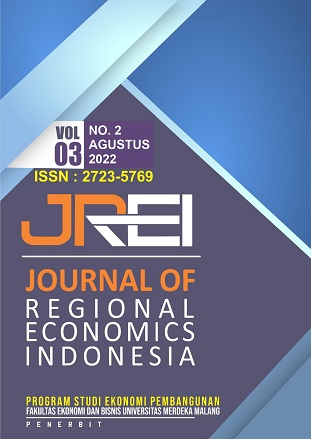Faktor-Faktor yang Mempengaruhi Produk Domestik Bruto di Asia Tenggara
DOI:
https://doi.org/10.26905/jrei.v3i2.8452Abstract
The indicator of economic growth in a country is the Gross Domestic Product. This study aims to analyze the influence of economic factors and human development on Gross Domestic Product in Southeast Asia during the period 2017-2019. This study uses panel data analysis with descriptive and quantitative methods. The results of the study found that partially the variables of government expenditure, labor force, and human development index have a positive and significant effect on Gross Domestic Product in Southeast Asia, while foreign investment do not have a significant effect on Gross Domestic Product in Southeast Asia. Simultaneously, the variables of government expenditure, foreign investment, labor force, and the human development index have a positive and significant effect on the Gross Domestic Product in Southeast Asia.Downloads
References
Afiyah. (2019). Pengaruh Indeks Pembangunan Manusia (IPM) dan Inflasi terhadap Produk Domestik Regional Bruto Provinsi Banten Periode 2010-2016. Universitas Islam Negeri Sultan Maulana Hasanuddin Banten.
Aluthge, C., Jibir, A., & Abdu, M. (2021). Impact of Government Expenditure on Economic Growth in Nigeria, 1970-2019. Central Bank of Nigeria Journal of Applied Statistics, 12(1), 139–174. https://doi.org/10.33429/cjas.12121.6/6
Amiruddin. (2018). Aliran Penanaman Modal Asing dan Dampaknya terhadap Pertumbuhan Ekonomi Indonesia. Jurnal Manajemen Dan Keuangan, 7(2), 192. https://doi.org/10.33059/jmk.v7i2.912
Handayani, T., Susetyo, D., & Saleh, M. S. (2019). Pengaruh Belanja Modal, Infrastruktur dan Indeks Pembangunan Manusia terhadap Produk Domestik Regional Bruto di Provinsi Sumatera Selatan. Jurnal Ekonomi Pembangunan, 15(2), 92–100. https://doi.org/10.29259/jep.v15i2.8837
Harahap, J. D. (2019). Pengaruh Jumlah Angkatan Kerja dan Investasi terhadap Produk Domestik Regional Bruto (PDRB) di Sumatera Utara. Institut Agama Islam Negeri Padangsidimpuan.
IMF. (2017). Regional Economic Outlook Update: Asia Pacific, October 2017: Making the Most of the Upswing. Regional Economic Outlook - International Monetary Fund, October 2017, 1–21.
Jhingan, M. L. (2016). Ekonomi Pembangunan dan Perencanaan. Rajawali Pers.
Lamah, A. I. A., Yanto, H., & Setyadharma, A. (2021). The Impact of Consumer Price Index, Foreign Direct Investment, Bank Credit and Labour Force on Economic Growth in Indonesia. Business and Economic Analysis Journal, 1(2), 79–91. https://journal.unnes.ac.id/nju/index.php/beaj/article/view/33588
M, S., Yolanda, S., & Sebayang, K. D. A. (2015). Effect Invesment and The Rate of Inflation to Economic Growth in Indonesia. Trikonomika, 14(1), 87–95. https://doi.org/10.23969/trikonomika.v14i1.595
Manopode, S., Naukoko, A., & Mandeij, D. (2019). Analisis Pengaruh Aliran Investasi Asing Dan Perdagangan Internasional terhadap Produk Domestik Bruto Di Indonesia (2013.I – 2017.Iv). Jurnal Berkala Ilmiah Efisiensi, 19(02), 94–107.
Mongan, J. J. S., & Saputra, P. M. A. (2012). Pengaruh Pengeluaran Pemerintah , Investasi dan Inflasi terhadap Produk Domestik Bruto di ASEAN 5. Jurnal Ilmiah Mahasiswa FEB Universitas Brawijaya.
Nasir, M. S., Wibowo, A. R., & Yansyah, D. (2021). The Determinants of Economic Growth: Empirical Study of 10 Asia-Pacific Countries. Signifikan: Jurnal Ilmu Ekonomi, 10(1), 149–160. https://doi.org/10.15408/sjie.v10i1.18752
Pambudi, A. S. (2020). Analisis Keterkaitan Indeks Pembangunan Manusia Terhadap Indeks Kualitas Lingkungan Hidup di Sulawesi Selatan. Jurnal Inovasi Aparatur, 2(1), 109–123.
Pamungkas, D. S. (2022). Determinan PDB 7 Negara ASEAN tahun 2016-2020. Universitas Muhammadiyah Surakarta.
Putra, Z. H. (2022). Pengaruh Foreign Direct Investment, Pengeluaran Pemerintah, Angkatan Kerja, Inflasi dan Trade Openness terhadap Pertumbuhan Ekonomi di Negara-Negara ASEAN. Universitas Andalas.
Putri, S. N., Suyanto, & Djoemadi, F. R. (2019). Analisis Pengaruh Trade Openness Terhadap Gross Domestic Product ASEAN-5 Periode 2005-2014. Calyptra: Jurnal Ilmiah Mahasiswa Universitas Surabaya, 7(2), 1–12.
Safari, M. fitriani. (2016). Analisis Pengaruh Ekspor, Pembentukan Modal, Dan Pengeluaran Pemerintah Terhadap Pertumbuhan Ekonomi Indonesia Skripsi. In Skripsi. Universitas Negeri Yogyakarta.
Sukirno, S. (2016). Makroekonomi Teori Pengantar Edisi Ketiga. Rajawali Pers.
Todaro, M. P., & Smith, S. C. (2011). Pembangunan Ekonomi Edisi Kesebelas Jilid 1. Penerbit Erlangga.
Widarjono, A. (2018). Ekonometrika Pengantar dan Aplikasinya Disertai Panduan Eviews Edisi Kelima. UPP STIM YKPN.
Widianatasari, A. (2021). Pengaruh Kualitas Institusi, Government Size, Dan Foreign Direct Investment terhadap Pertumbuhan. Universitas Diponegoro.
World Bank. (2017). World Bank East Asia and Pacific Economic Update, April 2017 : Sustaining Resilience. In Developing Sustainable Leadership (Issue April). The World Bank. http://hdl.handle.net/10986/26332
Yuniana, E. (2018). Analisis Pengaruh Indeks Pembangunan Manusia, Tenaga Kerja, dan Tabungan terhadap Produk Domestik Regional Bruto pada Kabupaten dan Kota di Provinsi. Universitas Islam Indonesia.
Downloads
Additional Files
Published
Issue
Section
License
License JREI: Journal of Regional Economics Indonesia, University of Merdeka Malang is licensed under Creative Commons Attribution Attribution-NonCommercial-NoDerivatives 4.0 International License.
JREI: Journal of Regional Economics Indonesia, University of Merdeka Malang is licensed under Creative Commons Attribution Attribution-NonCommercial-NoDerivatives 4.0 International License.
Copyright
Authors who publish with this journal agree to the following terms:
- Authors retain copyright and grant the journal right of first publication with the work simultaneously licensed under a Creative Commons Attribution Attribution-NonCommercial-NoDerivatives 4.0 International License that allows others to share the work with an acknowledgment of the work's authorship and initial publication in this journal.
- Authors are able to enter into separate, additional contractual arrangements for the non-exclusive distribution of the journal's published version of the work (e.g., post it to an institutional repository or publish it in a book), with an acknowledgment of its initial publication in this journal.
- Authors are permitted and encouraged to post their work online (e.g., in institutional repositories or on their website) before and during the submission process, as it can lead to productive exchanges and earlier and greater citation of published work (See The Effect of Open Access).




